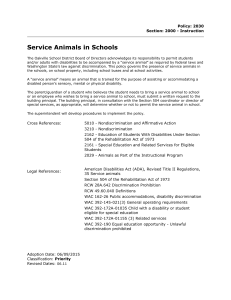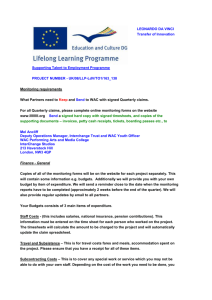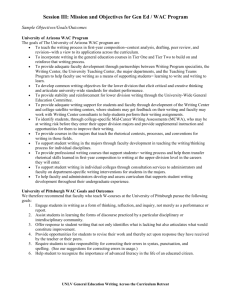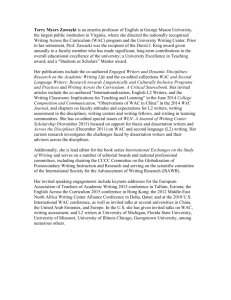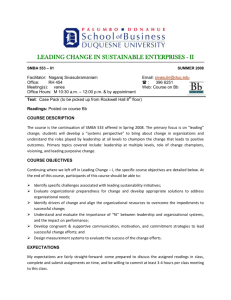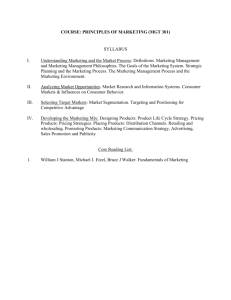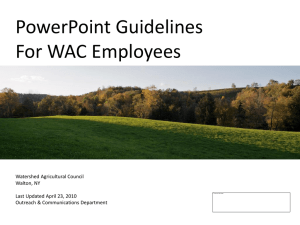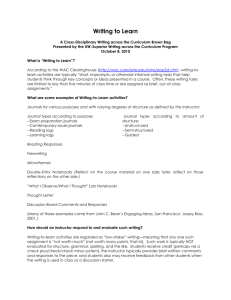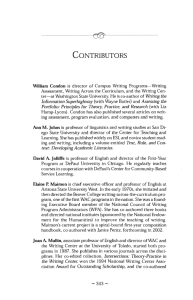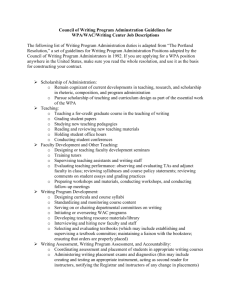RECREATIONAL DEVELOPMENT WAC 173-26-241(3) - E
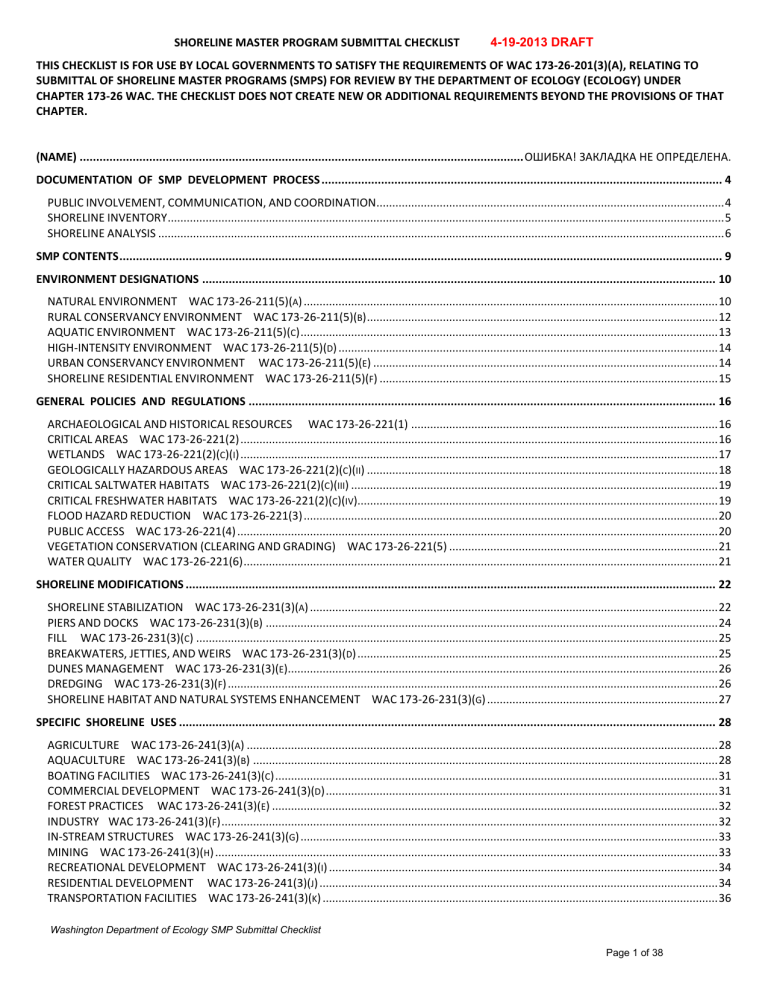
SHORELINE MASTER PROGRAM SUBMITTAL CHECKLIST 4-19-2013 DRAFT
THIS CHECKLIST IS FOR USE BY LOCAL GOVERNMENTS TO SATISFY THE REQUIREMENTS OF WAC 173-26-201(3)(A), RELATING TO
SUBMITTAL OF SHORELINE MASTER PROGRAMS (SMPS) FOR REVIEW BY THE DEPARTMENT OF ECOLOGY (ECOLOGY) UNDER
CHAPTER 173-26 WAC. THE CHECKLIST DOES NOT CREATE NEW OR ADDITIONAL REQUIREMENTS BEYOND THE PROVISIONS OF THAT
CHAPTER.
(NAME) ...................................................................................................................................... ОШИБКА! ЗАКЛАДКА НЕ ОПРЕДЕЛЕНА.
NATURAL ENVIRONMENT WAC 173-26-211(5)(
PIERS AND DOCKS WAC 173-26-231(3)(
BOATING FACILITIES WAC 173-26-241(3)(
RESIDENTIAL DEVELOPMENT WAC 173-26-241(3)(
Washington Department of Ecology SMP Submittal Checklist
Page 1 of 38
Washington Department of Ecology SMP Submittal Checklist
Page 2 of 38
INSTRUCTIONS
This checklist is intended to help in preparation and review of local shoreline master programs (SMPs). Local governments shall include a completed checklist with all locally-approved SMPs submitted to Ecology for review and approval. See WAC 173-26-201(3)(a).
Information should be provided at the top of the checklist that identifies which local jurisdiction and specific amendment (e.g. comprehensive update, environment re-designation or other topic) the checklist is submitted for, and who prepared it. Please indicate in the location column where in the SMP (or other documents) the requirement is satisfied. If adopting other regulations by reference, identify which specific adopted version of a local ordinance is being used, and attach a copy of the ordinance.
SMP submittals: For draft submittals, local governments may use the checklist’s Comments column to note any questions or concerns about proposed language. Ecology may then use the Comment field to respond as needed (see example below).
Ecology has attempted to make this checklist an accurate and concise summary of rule requirements; however, the agency must rely solely on state statutes (RCWs) and rules (WACs) when approving or denying a shoreline program. This checklist does not create new or additional requirements beyond the provisions of state laws and rules. See WAC 173-26-201(3)(a).
EXAMPLE: Use of the Comments column for a draft submittal
STATE RULE (WAC) REQUIREMENTS
High-intensity environment designation criteria: Areas within incorporated municipalities, Urban Growth Areas, and “rural areas of more intense development” (see RCW 36.70A.070) that currently support or are planned for high-intensity waterdependent uses. WAC 173-26-211(5)(d)(iii)
LOCATION
Urban Industrial, p. 15
Urban Mixed, p. 18
Also see Appendix B, Use
Analysis, Chapter 3, p. 12.
COMMENTS
Local government: SMP includes two urban designations that meet high intensity criteria
(Urban Industrial, Urban Mixed).
These alternative designations allow more specificity for public access, view and amenity requirements for the mixed use areas.
[Ecology example]
Non-Compliant:
The City…
Required or Recommended
Change:
The SMP-Guidelines….
Acronyms and abbreviations comp plan: Comprehensive Plan
CUP: Conditional Use Permit
SMA: Shoreline Management Act, RCW 90.58
SMP: Shoreline Master Program
SSWS: Shorelines of Statewide Significance
WAC: Washington Administrative Code
For more information
SMA (Ch. 90.58 RCW): http://apps.leg.wa.gov/rcw/default.aspx?cite=90.58
Guidelines (Ch. 173-26, Part III WAC): http://apps.leg.wa.gov/wac/default.aspx?cite=173-26
Ecology’s Shoreline Planners Toolbox: www.ecy.wa.gov/programs/sea/shorelines/smp/toolbox.html
Ecology SMA Policy Lead: Peter Skowlund: (360) 407-6522
Washington Department of Ecology SMP Submittal Checklist
Page 3 of 38
SHORELINE MASTER PROGRAM SUBMITTAL CHECKLIST
Prepared for:
The City of West Richland
Name of Amendment: Draft City of West Richland Reporting
Prepared by:
Brad Medrud, AHBL, Inc., Consultant for the City of West Richland
Date: 4/19/2013
STATE RULE (WAC) REQUIREMENTS LOCATION
DOCUMENTATION OF SMP DEVELOPMENT PROCESS
PUBLIC INVOLVEMENT, COMMUNICATION, AND COORDINATION
Documentation of public involvement throughout SMP development process. WAC 173-26-201(3)(b)(i) and WAC
173-26-090 and 100. For SSWS, see WAC 173-26-
251(3)(a).
(1) Refer to Public Participation Program prepared as part of SMA Grant, Task 1.2, and to SMP Appendix 1 -
Communication – Information Request Letter, Open
House/Visioning Notice, Distribution Mailing List
Documentation of communication with state agencies
and affected Indian tribes throughout SMP development. WAC 173-26-201(3)(b)(ii) and (iii), WAC
173-26-100(3).
For saltwater shorelines, see WAC 173-26-
221(2)(c)(iii)(B).
For SSWS, see WAC 173-26-251(3)(a).
(2) CIA, SMP SMP Appendix 1 - Communication –
Information Request Letter, Open House/Visioning
Notice, Distribution Mailing List
Not applicable
(2a) CIA, SMP SMP Appendix 1 - Communication –
Information Request Letter, Open House/Visioning
Notice, Distribution Mailing List
Demonstration that critical areas regulations for shorelines are based on the SMA and the guidelines, and assures no net loss of shoreline ecological functions necessary to sustain shoreline natural resources. WAC
173-26-221(2)(b)(ii),(iii) and (c). EHB 1653.
(3) SMP Chapter 4.B.3 – Critical Areas, .8 – Structural
Flood Hazard Reduction Measures, and .10 –
Vegetation Conservation
Documentation of process to assure that proposed regulatory or administrative actions do not
(4) Addressed in SMP Chapter 6.B.1.b – Permit
Processing – General, SMP Chapter 6.L.1.e. and SMP
Washington Department of Ecology SMP Submittal Checklist
COMMENTS
Page 4 of 38
STATE RULE (WAC) REQUIREMENTS unconstitutionally infringe upon private property rights.
See "State of Washington, Attorney General's
Recommended Process for Evaluation of Proposed
Regulatory or Administrative Actions to Avoid
Unconstitutional Takings of Private Property.” WAC 173-
26-186(5).
LOCATION
Chapter 4.B.1.b.3 - Universally Applicable Policies and
Regulations
In addition, private property rights are addressed in
SMP Chapter 1.A, 1.B, Subsections 4.B.6.b.7, 8.g), and
.10, Subsection 5.D.1.b.7, and Subsection 5.D.12.b.9, c.4.d).
Final submittal includes:
Evidence of local government approval (or a locally approved “statement of intent to adopt”);
New and/or amendatory text, environment designation maps (with boundary descriptions and justification for changes based on existing development patterns, biophysical capabilities and limitations, and the goals and aspirations of the local citizenry);
A summary of the proposal together with staff reports and supporting materials;
Evidence of SEPA compliance;
Copies of all comments received and a record of names and addresses of interested parties involved in local processes. WAC 173-26-110.
Submittal must include clear identification and transmittal of all provisions that make up the SMP. This
checklist, if complete, meets this requirement. WAC 173-
26-210(3)(a) and (h).
Not applicable at this time.
SHORELINE INVENTORY
Inventory of existing data and materials. WAC 173-26-
201(3)(c)(i) through (x).
Inventory of all “shorelines of the state”: Include lists and map(s) of all SMA marine, riverine, and lacustrine water bodies, including “shorelands”, “floodways”, and
“floodplains”. RCW 90.58.030(2) & WAC’s 173-18-044,
173-20-044, 173-22-050, 173-26-211(b, c, d).
For jurisdictions with critical saltwater habitats, see WAC
173-26-221(2)(c)(iii)(A)&(B).
Preliminary Inventory included on Data CD.
Additional work completed as part of Amendment 2 to
SMA Grant, Task 2.2.
Washington Department of Ecology SMP Submittal Checklist
COMMENTS
Page 5 of 38
STATE RULE (WAC) REQUIREMENTS
SHORELINE ANALYSIS
LOCATION
Characterization of shoreline ecosystems and their associated ecological functions that:
Identifies ecosystem-wide processes and ecological functions;
Assesses ecosystem-wide processes to determine their relationship to ecological functions;
Identifies specific measures necessary to protect and/or restore the ecological functions and ecosystem-wide processes. WAC 173-26-
201(3)(d)(i)(A).
Demonstration of how characterization was used to prepare master program policies and regulations that achieve no net loss of ecological functions necessary to support shoreline resources and to plan for restoration of impaired functions. WAC 173-26-201(3)(d)(i)(E).
For vegetation, see WAC 173-26-221(5). For jurisdictions with critical saltwater habitats, see WAC 173-26-
221(2)(c)(iii)(B).
Description of data gaps, assumptions made and risks to ecological functions associated with SMP provisions.
WAC 173-26-201(2)(a).
Characterization includes maps of inventory information at appropriate scale. WAC 173-26-201(3)(c).
Cumulative Impact Analysis
No Net Loss Report will be part of the Cumulative Impact
Analysis
No Net Loss Report will be part of the Cumulative Impact
Analysis
Data Gaps Section of the Shoreline Inventory and
Characterization
Map Folio
Use analysis estimating future demand for shoreline space and potential use conflicts based on characterization of current shoreline use patterns and projected trends. Evidence that SMP ensures adequate shoreline space for projected shoreline preferred uses.
Public access needs and opportunities within the jurisdiction are identified. Projections of regional economic need guide the designation of "high intensity”
Shoreline Inventory and Characterization and Cumulative
Impacts Analysis
Washington Department of Ecology SMP Submittal Checklist
COMMENTS
Page 6 of 38
STATE RULE (WAC) REQUIREMENTS shoreline. WAC 173-26-201(3)(d)(ii) & (v); WAC 173-26-
211(5)(d)(ii)(B)
Not applicable
LOCATION
For SMPs that allow mining, demonstration that siting of mines is consistent with requirements of WAC 173-26-
241(3)(h)(i).
For shorelines of the state:
Evidence the SMP preserves adequate shorelands and submerged lands to accommodate current and projected demand for economic resources
of statewide importance (e.g., commercial shellfish beds and navigable harbors) based on statewide or regional analyses, requirements for essential public facilities, and comment from related industry associations, affected Indian tribes, and state agencies. RCW 90.58.100.
Evidence that public access and recreation requirements are based on demand projections that take into account activities of state agencies and interests of the citizens to visit public shorelines with special scenic qualities or cultural or recreational opportunities. WAC
173-26-251(3)(c)(ii) & (iii).
For shorelines of statewide significance:
Optimum implementation directives incorporated into comp plan and development regulations. RCW
90.58.100. For GMA jurisdictions, SMP recreational provisions are consistent with growth projections and level-of-service standards contained in comp plan. WAC
173-26-241(3)(i).
(5) SMP Chapter 2.B Economic Development Element
5.D.1.b.3., 4 and .5 - Shoreline Use Policies and
Regulations
(6) SMP Chapter 2.C Public Access Element and SMP
Chapter 2.D Recreation Element;
SMP Chapter 4.B.5.c.1.b) – Public Access Regulations
SMP Chapter 5.D.12.b.3 Recreational Policies
Shoreline Inventory and Characterization
(7) SMP Chapter 2.D Recreation Element
SMP Chapter 5.D.12.b.3 Recreational Policies
Restoration plan that:
Identifies degraded areas, impaired ecological functions, and potential restoration sites;
Establishes restoration goals and priorities, including
SMP goals and policies that provide for restoration of impaired ecological functions;
Identifies existing restoration projects and programs;
A Restoration Plan needs to be completed. The Plan identifies prioritized restoration opportunities identified in the Shoreline Inventory and Characterization.
Washington Department of Ecology SMP Submittal Checklist
COMMENTS
Page 7 of 38
STATE RULE (WAC) REQUIREMENTS
Identifies additional projects and programs needed to achieve local restoration goals, and implementation strategies including identifying prospective funding sources;
Sets timelines and benchmarks for implementing restoration projects and programs;
Provides mechanisms or strategies to ensure that restoration projects and programs will be implemented according to plans and to appropriately review the effectiveness of the projects and programs in meeting the overall restoration goals. WAC 173-26-186(8)(c);
201(2)(c)&(f).
For critical freshwater habitats: incentives to restore water connections impeded by previous development.
WAC 173-26-221(2)(c)(iv)(C)(III).
For SSWS, identification of where natural resources of statewide importance are being diminished over time, and master programs provisions that contribute to the restoration of those resources. WAC 173-26-251(3)(b).
LOCATION
Evidence that each environment designation is consistent with guidelines criteria [WAC 173-26-211(5)], as well as existing use pattern, the biological and physical character of the shoreline and the goals and aspirations of the community. WAC 173-26-211(2)(a).
WAC 173-26-110(3).
Lands designated as “forest lands of long-term significance” under RCW 36.70A.170 are designated either natural or rural conservancy shoreline environment designations. WAC 173-26-241(3)(e).
For SSWS, demonstration that environment designation policies, boundaries, and use provisions implement SMA preferred use policies of RCW 90.58.020(1) through (7).
WAC 173-26-251(3)(c)
(8) Each shoreline environment designation is listed in
SMP Chapter 3.E.1 - .4.
Not applicable
(9) SMP Chapters 3 and 5.
Assessment of how proposed policies and regulations cause, avoid, minimize and mitigate cumulative impacts to achieve no net loss. Include policies and regulations that address platting or subdividing of property, laying of
Washington Department of Ecology SMP Submittal Checklist
Cumulative Impact Analysis
COMMENTS
Page 8 of 38
STATE RULE (WAC) REQUIREMENTS utilities, and mapping of streets that establish a pattern for future development. Evaluation addresses:
(i) current circumstances affecting the shorelines and relevant natural processes;
(ii) reasonably foreseeable future development and use of the shoreline (including impacts from unregulated activities, exempt development, and other incremental impacts); and
(iii) beneficial effects of any established regulatory programs under other local, state, and federal laws.
WAC 173-26-201(3)(d)(iii) and WAC 173-26-186(8)(d).
For jurisdictions with critical saltwater habitats, identification of methods for monitoring conditions and adapting management practices to new information.
WAC 173-26-221(2)(c)(iii)(B).
For SSWS, evidence that standards ensuring protection of ecological resources of statewide importance consider cumulative impacts of permitted development. WAC
173-26-251(3)(d)(i).
Not applicable
Throughout SMP
SMP CONTENTS
LOCATION
Any goals adopted as part of the SMP are consistent with the SMA. (Note: Goal statements are not required.)
(10) Goals & Policies are outlined in Chapters 2, 3, 4, and
5 of the draft SMP.
Policies (A) are consistent with guidelines and policies of the SMA; (B) address elements of RCW 90.58.100; (C) include policies for environment designations, accompanied by a map or physical description of designation boundaries in sufficient detail to compare with comprehensive plan land use designations; and (D) are consistent with constitutional and other legal limitations on regulation of private property. WAC 173-
26-191(2)(a)(i).
SMP implements preferred use policies of the SMA.
WAC 173-26-201(2)(d).
(11) The proposed SMA policies have been evaluated and are consistent with the guidelines and policies of the
SMPA. Policies for each environmental designation are outlined in SMP Chapter 3.E.
(12) SMP Chapter 1.A
SMP Chapter 3.E.1.d.1, .2.d.8, .3.d.3, and .4.d.7
Regulations: (A) are sufficient in scope and detail to ensure the implementation of the SMA, SMP guidelines, and SMP policies; (B) include environment designation
Washington Department of Ecology SMP Submittal Checklist
The SMP regulations have been evaluated and are consistent with the guidelines and policies of the SMA.
COMMENTS
Page 9 of 38
STATE RULE (WAC) REQUIREMENTS regulations; (C) include general regulations, use regulations that address issues of concern in regard to specific uses, and shoreline modification regulations; and, (D) are consistent with constitutional and other legal limitations on the regulation of private property.
WAC 173-26-191(2)(a)(ii).
Prohibition on new: Not Applicable
LOCATION
Height Limitation: SMP prohibits buildings and structures >35 feet in height obstructing views of residences, with exceptions. RCW 90.58.320.
NATURAL ENVIRONMENT WAC 173-26-211(5)(a)
Designation criteria: Shorelines that are ecologically intact and performing functions that could be damaged by human activity, are of particular scientific or educational interest, or are unable to support human development without posing a safety threat. WAC 173-
26-211(5)(a)(iii).
(13) SMP Chapter 5.C. Table 4 – Maximum Shoreline
Heights
ENVIRONMENT DESIGNATIONS
Each environment designation includes: Purpose statements, classification criteria, management policies, and regulations (types of shoreline uses permitted, conditionally permitted, and prohibited; building or structure height and bulk limits, setbacks, maximum density or minimum frontage requirements, and site development standards). WAC 173-26-211(2)(4).
(14) Purpose statements, classification criteria, management policies, and regulations for each proposed environment designation are located in
SMP Chapter 3.E.
Allowed uses and dimensional requirements for each shoreline environment designation are located in
SMP Chapter 5.B – Table 2 and .C – Table 3 (and note
6), and Table 4 (and note 2).
An up-to-date map accurately depicting environment designation boundaries. If necessary, include common boundary descriptions. WAC 173-26-211(2)(b); WAC
173-26-110(3).
(15) Shoreline Inventory and Characterization and SMP
Map Folio, Figures 9.1 and 9.2
SMP, Chapter 3.E.1.c, 2.c, 3.c, and 4.c
(16) SMP, Chapter 3.B Statement that undesignated shorelines are automatically assigned a conservancy environment designation. WAC 173-26-211(2)(e).
Not Applicable
.
Washington Department of Ecology SMP Submittal Checklist
COMMENTS
Page 10 of 38
STATE RULE (WAC) REQUIREMENTS
Uses that would substantially degrade ecological functions or natural character of shoreline.
WAC 173-26-211(5)(a)(ii)(A).
Commercial uses; industrial uses; nonwater oriented recreation; roads, utility corridors, and parking areas. WAC 173-26-211(5)(a)(ii)(B).
Development or significant vegetation removal that would reduce the capability of vegetation to perform normal ecological functions. WAC 173-
26-211(5)(a)(ii)(G).
Subdivision of property in a configuration that will require significant vegetation removal or shoreline modification that adversely impacts ecological functions. WAC 173-26-
211(5)(a)(ii)(G).
Not Applicable
Not Applicable
Not Applicable
For single family residential development: limits on density and intensity to protect ecological functions, and requirement for CUP. WAC 173-26-211(5)(a)(ii)(C).
Not Applicable
For commercial forestry: requirement for CUP, requirement to follow conditions of the State Forest
Practices Act. WAC 173-26-211(5)(a)(ii)(D).
Not Applicable
For agriculture: low intensity use allowed if subject to appropriate limits or conditions to assure that the use does not expand or practices don’t conflict with purpose of the designation. WAC 173-26-211(5)(a)(ii)(E).
Not Applicable
LOCATION
Washington Department of Ecology SMP Submittal Checklist
COMMENTS
Page 11 of 38
STATE RULE (WAC) REQUIREMENTS
Low intensity public uses such as scientific, historical, cultural, educational research uses, and water-oriented recreational access allowed if ecological impacts are avoided. WAC 173-26-211(5)(a)(ii)(F).
Not Applicable
RURAL CONSERVANCY ENVIRONMENT WAC 173-26-211(5)(b)
Designation criteria: areas outside municipalities or
UGAs with: (A) low-intensity, resource-based uses, (B) low-intensity residential uses, (C) environmental limitations such as steep banks or floodplains, (D) high recreational or cultural value, or (E) low-intensity waterdependent uses. WAC 173-26-211(5)(b)(iii).
Not Applicable.
Restrictions on use and development that would
degrade or permanently deplete resources. Water dependent and water enjoyment recreation facilities are preferred uses. Low intensity, water-oriented commercial and industrial uses limited to areas where those uses have located in the past or at sites that possess conditions and services to support the development. WAC 173-26-211(5)(b)(ii)(A) and (B).
For SMPs that allow mining, see WAC 173-26-241(3)(h).
Not Applicable.
Prohibition on new structural shoreline stabilization
and flood control works except where there is documented need to protect an existing primary structure (provided mitigation is applied) or to protect ecological functions. WAC 173-26-211(5)(b)(ii)(C).
Not Applicable.
Development standards for residential use that preserve existing character of the shoreline. Density, lot coverage, vegetation conservation and other provisions that ensure no net loss of shoreline ecological functions.
Density or lot coverage limited to a maximum of ten percent total impervious surface area within the lot or parcel, or alternative standard that maintains the existing hydrologic character of the shoreline. (May include provisions allowing greater lot coverage for lots legally created prior to the adoption of a master
Not Applicable.
Washington Department of Ecology SMP Submittal Checklist
LOCATION COMMENTS
Page 12 of 38
STATE RULE (WAC) REQUIREMENTS program prepared under these guidelines, if lot coverage is minimized and vegetation is conserved.) WAC 173-26-
211(5)(b)(ii)(D).
AQUATIC ENVIRONMENT WAC 173-26-211(5)(c)
Designation criteria: Areas waterward of the ordinary high-water mark (OHWM). WAC 173-26-211(5)(c)(iii).
LOCATION
(17) SMP, Chapter 3.E.4.b
New over-water structures:
Allowed only for water-dependent uses, public access, or ecological restoration. WAC 173-26-
211(5)(c)(ii)(A).
Limited to the minimum necessary to support the structure's intended use. WAC 173-26-
211(5)(c)(ii)(B).
Multiple use of over-water facilities encouraged. WAC
173-26-211(5)(c)(ii)(C).
(18)
(19)
(20)
SMP, Chapter 3.E.4.d.1
SMP, Chapter 3.E.4.d.2
SMP, Chapter 3.E.4.d.3
Location and design of all developments and uses required to:
Minimize interference with surface navigation, to consider impacts to public views, and to allow for the safe, unobstructed passage of fish and wildlife, particularly those species dependent on migration. WAC 173-26-211(5)(c)(ii)(D).
Prevent water quality degradation and alteration of natural hydrographic conditions. WAC 173-26-
211(5)(c)(ii)(F).
Uses that adversely impact ecological functions of critical saltwater and freshwater habitats limited (except where necessary for other SMA objectives, and then only when their impacts are mitigated). WAC 173-26-
211(5)(c)(ii)(E).
(21) SMP, Chapter 3.E.4.d.4
(22) SMP Chapter 3.E.4.d.5
(23) SMP Chapter 3.E.4.d.6
Washington Department of Ecology SMP Submittal Checklist
COMMENTS
Page 13 of 38
STATE RULE (WAC) REQUIREMENTS
HIGH-INTENSITY ENVIRONMENT WAC 173-26-211(5)(d)
LOCATION
Designation criteria: Areas within incorporated municipalities, “UGAs,” and “rural areas of more intense development” (see RCW 36.70A.070) that currently support or are planned for high-intensity waterdependent uses. WAC 173-26-211(5)(d)(iii).
(24) SMP Chapter 3.E.1.b
Priority given first to water dependent uses, then to water-related and water-enjoyment uses. New nonwater oriented uses prohibited except as part of mixed use developments, or where they do not conflict with or limit opportunities for water oriented uses or where there is no direct access to the shoreline. WAC 173-26-
211(5)(d)(ii)(A).
(25) SMP Chapter 3.E.1.d.1 and .2
Full use of existing urban areas required before expansion of intensive development allowed. WAC 173-
26-211(5)(d)(ii)(B).
(26) SMP Chapter 3.E.1.d.3
New development does not cause net loss of shoreline ecological functions. Environmental cleanup and restoration of the shoreline to comply with relevant state and federal laws assured. WAC 173-26-
211(5)(d)(ii)(C).
(27) SMP Chapter 3.E.1.d.4 and .6
Visual and physical public access required where feasible. Sign control regulations, appropriate development siting, screening and architectural standards, and maintenance of natural vegetative buffers to achieve aesthetic objectives. WAC 173-26-
211(5)(d)(ii)(D) and (E).
(28) SMP Chapter 3.E.1.d.5, Chapter 5.D.14, Chapter
4.B.10
URBAN CONSERVANCY ENVIRONMENT WAC 173-26-211(5)(e)
Designation criteria: Areas within incorporated municipalities, UGAs, and “rural areas of more intense development” not suitable for water-dependent uses but suitable for water-related or water-enjoyment uses, are flood plains, have potential for ecological restoration, retain ecological functions, or have potential
(29) SMP Chapter 3.E.3.b
Washington Department of Ecology SMP Submittal Checklist
COMMENTS
Page 14 of 38
STATE RULE (WAC) REQUIREMENTS for development that incorporates ecological restoration. WAC 173-26-211(5)(e)(iii).
LOCATION
Allowed uses are primarily those that preserve natural character of area, promote preservation of open space, floodplain or sensitive lands, or are appropriate for restoration. WAC 173-26-211(5)(e)(ii)(A).
Priority given to water oriented uses over non-water oriented uses. For shoreline areas adjacent to commercially navigable waters, water dependent uses given highest priority. WAC 173-26-211(5)(e)(ii)(D).
For SMPs that allow mining, see WAC 173-26-241(3)(h).
(30) SMP Chapter 3.E.3.d.1
(31) SMP Chapter 3.E.3.d.3
Not applicable
Standards for shoreline stabilization measures, vegetation conservation, water quality, and shoreline modifications that ensure new development does not result in a net loss of shoreline ecological functions or degrade other shoreline values. WAC 173-26-
211(5)(e)(ii)(B).
(32) SMP, Chapter 3.E.3.d.4
Public access and recreation required where feasible and ecological impacts are mitigated. WAC 173-26-
211(5)(e)(ii)(C).
(33) SMP, Chapter 3.E.3.d.2
SHORELINE RESIDENTIAL ENVIRONMENT WAC 173-26-211(5)(f)
Designation criteria: Areas within incorporated municipalities, UGAs, “rural areas of more intense development”, and “master planned resorts” (see RCW
36.70A.360) that are predominantly residential development or planned and platted for residential development. WAC 173-26-211(5)(f)(iii).
(34) SMP, Chapter 3.E.2.b
Standards for density or minimum frontage width, setbacks, buffers, shoreline stabilization, critical areas protection, and water quality protection assure no net loss of ecological function. WAC 173-26-211(5)(f)(ii)(A), and WAC 173-26-241(3)(j).
(35) SMP, Chapter 3.E.2.d.4
Multifamily and multi-lot residential and recreational developments provide public access and joint use for
Washington Department of Ecology SMP Submittal Checklist
(36) SMP, Chapter 3.E.2.d.6
COMMENTS
Page 15 of 38
STATE RULE (WAC) REQUIREMENTS community recreational facilities. WAC 173-26-
211(5)(f)(ii) (B).
LOCATION
Access, utilities, and public services required to be available and adequate to serve existing needs and/or planned future development. WAC 173-26-
211(5)(f)(ii)(C).
(37) SMP, Chapter 3.E.2.d.7
Commercial development limited to water oriented uses. WAC 173-26-211(5)(f)(ii)(D).
(38) SMP, Chapter 3.E.2.d.3
GENERAL POLICIES AND REGULATIONS
Moratoria. Under the authority of RCW 90.58.590, local governments may adopt moratoria or other interim official controls lasting up to six months. →
These controls may be extended twice. These official controls are not adopted as part of a shoreline master
program. →
ARCHAEOLOGICAL AND HISTORICAL RESOURCES WAC 173-26-221(1)
Developers and property owners required to stop work and notify the local government, state office of archaeology and historic preservation, and affected
Indian tribes if archaeological resources are uncovered during excavation. WAC 173-26-221(1)(c)(i).
(39) SMP, Chapter 4.B.2.c.1
(40) SMP, Chapter 4.B.2.c.2 Permits issued in areas documented to contain archaeological resources require site inspection or evaluation by a professional archaeologist in coordination with affected Indian tribes. WAC 173-26-
221(1)(c)(ii).
CRITICAL AREAS WAC 173-26-221(2)
Policies and regulations for critical areas (designated under GMA) located within shorelines of the state that
Are consistent with SMP guidelines
Provide a level of protection equal to critical areas within shorelines that satisfy the no net
loss of ecological functions requirement, as provided by the local government’s existing critical area regulations adopted pursuant to
Washington Department of Ecology SMP Submittal Checklist
(41) SMP, Chapter 4.B.3.b.1 and Chapter 4.B.3.c.1
.
COMMENTS
Page 16 of 38
STATE RULE (WAC) REQUIREMENTS the GMA for comparable areas other than shorelines. WAC 173-26-221(2)(a) and (c).
LOCATION
Planning objectives are for protection and restoration of degraded ecological functions and ecosystem-wide processes. Regulatory provisions protect existing ecological functions and ecosystem-wide processes.
WAC 173-26-221(2)(b)(iv).
Critical area provisions promote human uses and values, such as public access and aesthetic values, provided they do not significantly adversely impact ecological functions. WAC 173-26-221(2)(b)(v).
(42) SMP, Chapter 4.B.3.b.2 and Chapter 4.B.3.c.1
(43) SMP, Chapter 4.B.3.b.3
If SMP includes optional expansion of jurisdiction: Clear description of the inclusion of any land necessary for buffers of critical areas that occur within shorelines of the state, accurately depicting new SMP jurisdiction consistent with RCW 90.58.030(2)(f)(ii) and WAC 173-26-
221(2)(a).
Not Applicable
WETLANDS WAC 173-26-221(2)(c)(i)
Wetlands definition is consistent with WAC 173-22. (44) SMP, Chapter 7 - Definitions
Provisions requiring wetlands delineation method are consistent with WAC 173-22-035.
(45) SMP, Chapter 4.B.3.a
Regulations address all uses and activities listed in WAC
173-26-221(2)(c)(i)(A) to achieve no net loss of wetland area and functions, including lost time when the restoration does not perform the functions. WAC 173-
26-221(2)(c)(i)(A) + (C).
(46) SMP, Chapter 4.B.3 and Chapter 5
Wetlands rating or categorization system is based on rarity, irreplaceability, and/or sensitivity to disturbance of a wetland and the functions the wetland provides.
Use Ecology Rating System or regionally specific, scientifically based method. WAC 173-26-221(2)(c)(i)(B)]
(47) SMP, Chapter 4.B.3.a
Wetland Buffer requirements are adequate to ensure wetland functions are protected and maintained in the long-term, taking into account ecological functions of
Washington Department of Ecology SMP Submittal Checklist
(48) SMP, Chapter 4.B.3.a
COMMENTS
Page 17 of 38
STATE RULE (WAC) REQUIREMENTS the wetland, characteristics of the buffer, and potential impacts associated with adjacent land uses. WAC 173-
26-221(2)(c)(i)(B). Wetland buffer widths assume a naturally vegetated state; wider buffers or a revegetation plan may be needed if buffer is unvegetated or sparsely vegetated.
Wetland mitigation requirements are consistent with
WAC 173-26-201(2)(e) and are based on the wetland rating or other scientifically valid means demonstrating replacement of all functions lost (hydrologic, habitat, and water quality). WAC 173-26-221(2)(c)(i)(E) and (F).
LOCATION
(49) SMP, Chapter 4.B.3.a
Compensatory mitigation allowed only after mitigation sequencing is applied and higher priority means of mitigation are determined to be infeasible.
Compensatory mitigation requirements include (I) replacement ratios; (II) Performance standards for evaluating success; (III) long-term monitoring and reporting procedures; and (IV) long-term protection and management of compensatory mitigation sites. WAC
173-26-221(2)(c)(i)(F).
Compensatory mitigation requirements are consistent with preference for “in-kind and nearby” replacement, and include requirement for watershed plan if off-site mitigation is proposed. WAC 173-173-26-201(2)(e)(B).
(50) SMP, Chapter 4.B.3.a
GEOLOGICALLY HAZARDOUS AREAS WAC 173-26-221(2)(c)(ii)
Prohibition of new development and creation of new lots that would:
Cause foreseeable risk from geological conditions during the life of the development. WAC 173-26-
221(2)(c)(ii)(B);
Require structural shoreline stabilization over the life of the development. (Exceptions allowed where stabilization needed to protect allowed uses where no alternative locations are available and no net loss of ecological functions will result.) WAC 173-26-
(51) SMP, Chapter 4.B.3.a
Washington Department of Ecology SMP Submittal Checklist
COMMENTS
Page 18 of 38
STATE RULE (WAC) REQUIREMENTS
221(2)(c)(ii)(C).
LOCATION
New stabilization structures for existing primary residential structures allowed only where no alternatives
(including relocation or reconstruction of existing structures), are feasible, and less expensive than the proposed stabilization measure, and then only if no net loss of ecological functions will result. WAC 173-26-
221(2)(c)(ii)(D).
(52) SMP, Chapter 4.B.7.f.2.h)
CRITICAL SALTWATER HABITATS WAC 173-26-221(2)(c)(iii)
Prohibit new docks, bulkheads, bridges, fill, floats,
jetties, utility crossings and other structures in or over critical saltwater habitats, except where:
Public need is clearly demonstrated;
Avoidance of impacts is not feasible or would result in unreasonable cost;
The project include appropriate mitigation; and
The project is consistent with resource protection and species recovery.
Private, non-commercial docks for individual residential or community use allowed if it is infeasible to avoid impacts by alternative alignment or location and the project results in no net loss of ecological functions.
WAC 173-26-221(2)(c)(iii)(C).
Where inventory of critical saltwater habitat has not been done, all over water and near-shore developments in marine and estuarine waters require habitat assessment of site and adjacent beach sections. WAC
173-26-221(2)(c)(iii)(C)
Not Applicable
Not Applicable
Not Applicable
CRITICAL FRESHWATER HABITATS WAC 173-26-221(2)(c)(iv)
Requirements that ensure new development within stream channel, channel migration zone, wetlands, floodplain, hyporheic zone, does not cause a net loss of ecological functions. WAC 173-26-221(2)(c)(iv)(C)(I) and
WAC 173-26-221(2)(c)(iv)(B)(II).
(53) SMP, Chapter 4.B.3
Washington Department of Ecology SMP Submittal Checklist
COMMENTS
Page 19 of 38
STATE RULE (WAC) REQUIREMENTS
Authorization of appropriate restoration projects is facilitated. WAC 173-26-221(2)(c)(iv)(C)(III).
(54) SMP, Chapter 4.B.6
LOCATION
.b.1 through .4
Regulations protect hydrologic connections between water bodies, water courses, and associated wetlands.
WAC 173-26-221(2)(c)(iv)(C)(IV).
FLOOD HAZARD REDUCTION WAC 173-26-221(3)
New development within the channel migration zone
or floodway limited to uses and activities listed in WAC
173-26-221(3)(b) and (3)(c)(i).
New structural flood hazard reduction measures allowed only:
Where demonstrated to be necessary, and when non-structural methods are infeasible and mitigation is accomplished;
Landward of associated wetlands and buffer areas except where no alternative exists as documented in a geotechnical analysis. WAC
173-26-221(3)(c)(ii) & (iii).
New publicly funded dikes or levees required to dedicate and improve public access (see exceptions).
WAC 173-26-221(3)(c)(iv).
(55)
(56)
(57)
(58)
(59)
SMP, Chapter 4.B.3
SMP, Chapter 4.B.5.b.10, Chapter 4.B.5.c.11, and
Chapter 4.B.8.e.2.k)
Chapter 4.B.5.c.6
Chapter 4.B.5.c.6
SMP, Chapter 4.B.5.b.6.j), Chapter 4.B.5.c.9
Removal of gravel for flood control allowed only if biological and geomorphological study demonstrates a long-term benefit to flood hazard reduction, no net loss of ecological functions, and extraction is part of a comprehensive flood management solution. WAC 173-
26-221(3)(c)(v).
PUBLIC ACCESS WAC 173-26-221(4)
Applicability: Public access includes the ability of the general public to reach, touch, and enjoy the water's edge, to travel on the waters of the state, and to view the water and the shoreline from adjacent locations.
WAC 173-26-221(4)(d)(i). For S of SWS the SMP should
(60) Chapter 4.B.5.c.10
(61) SMP, Chapter 4.B.6.a
Washington Department of Ecology SMP Submittal Checklist
COMMENTS
Page 20 of 38
STATE RULE (WAC) REQUIREMENTS identify and evaluate all publicly owned shoreline parcels and their suitability for public access.
LOCATION
Policies and regulations protect and enhance both
physical and visual access. WAC 173-26-221(4)(d)(i).
(62) SMP, Chapter 4.B.6.c
Public entities are required to incorporate public access measures as part of each development project, unless access is incompatible with safety, security, or environmental protection. WAC 173-26-221(4)(d)(ii).
(63) SMP, Chapter 4.B.6.c.1
Provide standards for the dedication and improvement of public access in developments for water-enjoyment, water-related, and nonwater-dependent uses and for the subdivision of land into more than four parcels. In these cases, public access should be required [with certain exceptions].
(64) SMP, Chapter 4.B.6.c.2
Maximum height limits, setbacks, and view corridors minimize impacts to existing views from public property or substantial numbers of residences. WAC 173-26-
221(4)(d)(iv); RCW 90.58.320.
(65) SMP, Chapter 4.B.6.c.6 and Chapter 5.C, Tables 3 and
4
VEGETATION CONSERVATION (CLEARING AND GRADING) WAC 173-26-221(5)
Vegetation standards implement the principles in WAC
173-26-221(5)(b). Methods to do this may include setback or buffer requirements, clearing and grading standards, regulatory incentives, environment designation standards, or other master program provisions. WAC 173-26-221(5)(c).
(66) SMP, Chapter 4.B.10.b.1 - .5
SMP, Chapter 4.B.10.c.2, .4
Selective pruning of trees for safety and view protection is allowed and removal of noxious weeds is authorized.
WAC 173-26-221(5)(c).
(67) SMP, Chapter 4.B.10.c.6 and .9
WATER QUALITY WAC 173-26-221(6)
Provisions protect against adverse impacts to water
quality and storm water quantity and ensure mutual consistency between SMP and other regulations
(68) SMP, Chapter 4.B.11.b.1 and Chapter 4.B.11.c.1
Washington Department of Ecology SMP Submittal Checklist
COMMENTS
Page 21 of 38
STATE RULE (WAC) REQUIREMENTS addressing water quality. WAC 173-26-221(6).
LOCATION
SHORELINE MODIFICATIONS
SMP: (a) allows structural shoreline modifications only where demonstrated to be necessary to support or protect an allowed primary structure or a legally existing shoreline use that is in danger of loss or substantial damage or are necessary for mitigation or enhancement;
(b) limits shoreline modifications in number and extent;
(69) SMP, Chapter 4.B.8.a.10.e.3.a)
(70) SMP, Chapter 4.B.8.a.10.b.2.a), Chapter
4.B.8.a.10.b.2.c), Chapter 4.B.8.a.10.e.2.i), and
Chapter 5.D.15.c.6
(c) allows only shoreline modifications that are appropriate to the specific type of shoreline and environmental conditions for which they are proposed;
(d) gives preference to those types of shoreline modifications that have a lesser impact on ecological functions. Policies promote "soft" over "hard" shoreline modification measures
(71)
(72)
SMP, Chapter 4.B.8.a.10.b.2.c)
SMP, Chapter 4.B.8.a.10.b.2.b), Chapter
4.B.8.a.10.e.2.c), and Chapter 4.B.8.a.10.e.3.k).2).
(f) incorporates all feasible measures to protect ecological shoreline functions and ecosystem-wide processes as modifications occur;
(g) requires mitigation sequencing.
WAC 173-26-231(2); WAC 173-26-231(3)(a)(ii) and (iii);
(73)
(74)
SMP, Chapter 4.B.8.a.10.b.2.a) and Chapter
4.B.8.a.10.c.3.f)
SMP, Chapter 4.B.8.a.10.b.2.a) and Chapter
4.B.8.a.10.e.2.i)
SHORELINE STABILIZATION WAC 173-26-231(3)(a)
Definition: structural and nonstructural methods to address erosion impacts to property and dwellings, businesses, or structures caused by natural processes, such as current, flood, tides, wind, or wave action. WAC
173-26-231(3)(a)(i).
Definition of new stabilization measures include enlargement of existing structures. WAC 173-26-
(75) SMP, Chapter 7: Definitions
Washington Department of Ecology SMP Submittal Checklist
COMMENTS
Page 22 of 38
STATE RULE (WAC) REQUIREMENTS
231(3)(a)(iii)(C), last bullet; WAC 173-26-
231(3)(a)(iii)(B)(I), 5 th bullet).
LOCATION COMMENTS
Standards setting forth circumstances under which
shoreline alteration is permitted, and for the design and type of protective measures and devices. WAC 173-26-
231(3)(a)(ii).
(76) SMP, Chapter 4.B.8.a.10.b.3., Chapter 4.B.8.a.10.e.3., and Chapter 4.B.8.a.10.e.3.a)
New development (including newly created parcels) required to be designed and located to prevent the need for future shoreline stabilization, based upon geotechnical analysis.
New development on steep slopes and bluffs required to be set back to prevent need for future shoreline stabilization during life of the project, based upon geotechnical analysis.
New development that would require shoreline stabilization which causes significant impacts to adjacent or down-current properties and shoreline areas is prohibited. WAC 173-26-231(3)(a)(iii)(A).
(77) SMP, Chapter 4.B.8.a.10.e.2.d) and Chapter
4.B.8.a.10.e.3.d)
(78) SMP, Chapter 4.B.8.a.10.e.2.e) and Chapter
4.B.8.a.10.e.3.e)
(79) SMP, Chapter 4.B.8.a.10.e.2.f) and Chapter
4.B.8.a.10.e.3.f)
(80) SMP, Chapter 4.B.8.a.10.e.3.h) New structural stabilization measures are not allowed except when necessity is demonstrated. Specific requirements for how to demonstrate need are established for:
(I) existing primary structures;
(II) new non-water-dependent development including single family residences;
(III) water-dependent development; and
(IV) ecological restoration/toxic clean-up remediation projects. WAC 173-26-231(3)(a)(iii)(B)
Washington Department of Ecology SMP Submittal Checklist Page 23 of 38
STATE RULE (WAC) REQUIREMENTS LOCATION
Replacement of existing stabilization structures is based on demonstrated need. Waterward encroachment of replacement structure is allowed only for residences occupied prior to January 1, 1992, Or for soft shoreline stabilization measures that provide restoration of ecological functions. WAC 173-26-231(3)(a)(iii)(C).
(81) SMP, Chapter 4.B.8.a.10.e.3.j) and Chapter
4.B.8.a.10.e.3.j).2)
Geotechnical reports prepared to demonstrate need include estimates of rate of erosion and urgency
(damage within 3 years) and evaluate alternative solutions. WAC 173-26-231(3)(a)(iii)(D).
(82) SMP, Chapter 4.B.8.a.10.e.3.i).3)
Shoreline stabilization structures are limited to the
minimum size necessary. WAC 173-26-231(3)(a)(iii)(E).
(83) SMP, Chapter 4.B.8.e.2.j) and Chapter 4.B.8.e.3.c)
Public access required as part of publicly financed shoreline erosion control measures. WAC 173-26-
231(3)(a)(iii)(E).
(84) SMP, Chapter 4.B.8.a.10.e.2.l) and Chapter
4.B.8.a.10.e.3.l).3)
Impacts to sediment transport required to be avoided or minimized. WAC 173-26-231(3)(a)(iii)(E).
PIERS AND DOCKS WAC 173-26-231(3)(b)
(85) SMP, Chapter 4.B.8.a.10.e.2.m) and Chapter
4.B.8.a.10.e.3.g)
New piers and docks:
Allowed only for water-dependent uses or public access
Restricted to the minimum size necessary to serve a proposed water-dependent use.
Permitted only when specific need is demonstrated
(except for docks accessory to single-family residences).
Note: Docks associated with single family residences are defined as water dependent uses provided they are designed and intended as a facility for access to watercraft. WAC 173-26-231(3)(b).
Not Applicable
When permitted, new residential development of more than two dwellings is required to provide joint use or community docks, rather than individual docks. WAC
Not Applicable
Washington Department of Ecology SMP Submittal Checklist
COMMENTS
Page 24 of 38
STATE RULE (WAC) REQUIREMENTS
173-26-231(3)(b)
LOCATION
Design, construction & placement of piers, docks, mooring buoys, boat lifts, boat ramps, marine railways, and float plane facilities are required to avoid, minimize and mitigate for impacts to ecological processes and functions and be constructed of approved materials.
WAC 173-26-231(3)(b).
(86) SMP, Chapter 5.D.4.c.7.a) and Chapter 5.D.4.c.7.d)
FILL WAC 173-26-231(3)(c)
Definition of “fill” consistent with WAC 173-26-020(14). (87) SMP, Chapter 7 - Definitions
Location, design, and construction of all fills protect ecological processes and functions, including channel migration. WAC 173-26-231(3)(c).
(88) SMP, Chapter 4.B.8.d.2.d) and Chapter 4.B.8.d.3.b)
Fill waterward of the OHWM allowed only by shoreline conditional use permit, for:
(89) SMP, Chapter 4.B.8.d.2.a), Chapter 4.B.8.d.3.c), and
Chapter 4.B.8.d.2.d)
Water-dependent use;
Public access;
Cleanup and disposal of contaminated sediments as part of an interagency environmental clean-up plan;
Disposal of dredged material in accordance with
DNR Dredged Material Management Program;
Expansion or alteration of transportation facilities of statewide significance currently located on the shoreline (if alternatives to fill are shown not feasible);
Mitigation action, environmental restoration, beach nourishment or enhancement project. WAC
173-26-231(3)(c).
BREAKWATERS, JETTIES, AND WEIRS WAC 173-26-231(3)(d)
Structures waterward of the ordinary high-water mark allowed only for water-dependent uses, public access, shoreline stabilization, or other specific public purpose.
WAC 173-26-231(3)(d).
Not Applicable
Washington Department of Ecology SMP Submittal Checklist
COMMENTS
Page 25 of 38
STATE RULE (WAC) REQUIREMENTS
Shoreline conditional use permit required for all structures except protection/restoration projects. WAC
173-26-231(3)(d).
Protection of critical areas and appropriate mitigation required. WAC 173-26-231(3)(d).
DUNES MANAGEMENT WAC 173-26-231(3)(e)
Development setbacks from dunes prevent impacts to the natural, functional, ecological, and aesthetic qualities of the dunes. WAC 173-26-231(3)(e).
Dune modifications allowed only when consistent with state and federal flood protection standards and result in no net loss of ecological processes and functions.
WAC 173-26-231(3)(e).
Not Applicable
Not Applicable
Not Applicable
Not Applicable
LOCATION
Dune modification to protect views of the water shall be allowed only on properties subdivided and developed prior to the adoption of the master program and where the view is completely obstructed for residences or water-enjoyment uses and where it can be demonstrated that the dunes did not obstruct views at the time of original occupancy. WAC 173-26-231(3)(e).
Not Applicable
DREDGING WAC 173-26-231(3)(f)
Dredging and dredge material disposal avoids or
minimizes significant ecological impacts. Impacts which cannot be avoided are mitigated. WAC 173-26-231(3)(f).
(90) SMP, Chapter 4.B.8.c.2.b) and Chapter 4.B.8.c.3.a)
New development siting and design avoids the need for new and maintenance dredging. WAC 173-26-231(3)(f).
(91) SMP, Chapter 4.B.8.c.3.e)
Dredging to establish, expand, relocate or reconfigure
navigation channels allowed only where needed to accommodate existing navigational uses and then only when significant ecological impacts are minimized and when mitigation is provided. WAC 173-26-231(3)(f).
Not Applicable
Washington Department of Ecology SMP Submittal Checklist
COMMENTS
Page 26 of 38
STATE RULE (WAC) REQUIREMENTS LOCATION
Maintenance dredging of established navigation channels and basins restricted to maintaining previously dredged and/or existing authorized location, depth, and width. WAC 173-26-231(3)(f).
(92) SMP, Chapter 4.B.8.c.3.d)
Dredging for fill materials prohibited except for projects associated with MTCA or CERCLA habitat restoration, or any other significant restoration effort approved by a shoreline CUP. Placement of fill must be waterward of
OHWM. WAC 173-26-231(3)(f).
(93) SMP, Chapter 4.B.8.c.2.c) and d), and Chapter
4.B.8.c.3.f)
Uses of dredge material that benefits shoreline resources are addressed. If applicable, addressed through implementation of regional interagency dredge material management plans or watershed plan. WAC
173-26-231(3)(f).
(94) SMP, Chapter 4.B.8.c.3.h)
Disposal within river channel migration zones discouraged, and in limited instances when allowed, require CUP. (Note: not intended to address discharge of dredge material into the flowing current of the river or in deep water within the channel where it does not substantially affect the geo-hydrologic character of the channel migration zone). WAC 173-26-231(3)(f).
(95) SMP, Chapter 4.B.8.c.2.a) and Chapter 4.B.8.c.3.b)
SHORELINE HABITAT AND NATURAL SYSTEMS ENHANCEMENT WAC 173-26-231(3)(g)
Provisions that foster habitat and natural system
enhancement projects, provided the primary purpose is restoration of the natural character and functions of the shoreline, and only when consistent with implementation of the restoration plan developed pursuant to WAC 173-26-201(2)(f).
(96) A restoration plan will be completed. See page 5.
SMP, Chapter 4.B.7.c.1
Application For Relief option from expansion of SMA jurisdiction by shoreline restoration projects. RCW
90.58.580.
(97) SMP, Chapter 4.B.7.b.4
Washington Department of Ecology SMP Submittal Checklist
COMMENTS
Page 27 of 38
STATE RULE (WAC) REQUIREMENTS LOCATION
SPECIFIC SHORELINE USES
AGRICULTURE WAC 173-26-241(3)(a)
Use of agriculture related terms is consistent with the specific meanings provided in RCW 90.58.030 and .065.
(98) SMP, Chapter 7 - Definitions, Chapter 5.D.2.a
Provisions address new agricultural activities, conversion of agricultural lands to other uses, and other development not meeting the definition of agricultural activities.
Provisions assure that development in support of agricultural uses is: (A) consistent with the environment designation; and (B) located and designed to assure no net loss of ecological functions and not have a significant adverse impact on other shoreline resources and values.
WAC 173-26-241(3)(a)(ii) & (v).
(99) SMP, Chapter 5.D.2.b.2. and .4 and Chapter 5.D.2.c.1,
.2, and .3
(100) SMP, Chapter 5.D.2.b.2., .3, and .4 and Chapter
5.D.2.c.1 - .4
(101) SMP, Chapter 5.D.2.c.6 Shoreline substantial development permit is required for all agricultural development not specifically exempted by the provisions of RCW 90.58.030(3)(e)(iv).
(102) SMP, Chapter 5.D.2.c.7 Conversion of agricultural land to non-agricultural uses is consistent with the environment designation, and regulations applicable to the proposed use do not result in a net loss of ecological functions. WAC 173-26-
241(3)(a)(vi).
AQUACULTURE WAC 173-26-241(3)(b)
General Provisions (103) SMP, Chapter 5.D.3
Definition of aquaculture consistent with WAC 173-26-
020(6) and -241(3)(b)(i)(A).
(104) SMP, Chapter 7 - Definitions
Aquaculture is defined as dependent on the use of the
water area and, when consistent with control of pollution and prevention of damage to the environment, is a preferred use of the water area. WAC 173-26-
241(3)(b)(i)(A).
(105) SMP, Chapter 5.D.3.b.2
Washington Department of Ecology SMP Submittal Checklist
COMMENTS
Page 28 of 38
STATE RULE (WAC) REQUIREMENTS LOCATION
SMP recognizes that potential locations for aquaculture are restricted, technology associated with some forms of present-day aquaculture is still in its formative stages and experimental, and recognizes the need for some latitude in the development of this use as well as its potential impact on existing uses and natural systems.
WAC 173-26-241(3)(b)(i)(B).
(106) SMP, Chapter 5.D.3.b.3
General ecological siting considerations: Provisions require consideration of local ecological conditions and providing limits and conditions to assure appropriate compatible types of aquaculture for the local conditions as necessary to assure no net loss of ecological functions. WAC 173-26-241(3)(b)(i)(A).
Aquaculture is not permitted in areas where it would result in a net loss of ecological functions or adversely
impact eelgrass and/or macroalgae. Impacts to ecological functions shall be mitigated consistent with the mitigation sequence. Aquacultural facilities should be designed and located so as not to spread disease to native aquatic life, or establish new nonnative species which cause significant ecological impacts. WAC 173-26-
241(3)(b)(i)(C).
(107) SMP, Chapter 5.D.3.c.1.a)
(108) SMP, Chapter 5.D.3.c.1.b)
Aquaculture is not permitted in areas where it would significantly conflict with navigation and other water-
dependent uses. WAC 173-26-241(3)(b)(i)(C).
(109) SMP, Chapter 5.D.3.c.2
Aquacultural facilities should not significantly impact the
aesthetic qualities of the shoreline. WAC 173-26-
241(3)(b)(i)(C).
(110) SMP, Chapter 5.D.3.c.3
Provisions must ensure proper management of upland
uses to avoid degradation of water quality of existing shellfish areas. WAC 173-26-241(3)(b)(i)(D).
Inventory and characterization must include information specific to siting in-water uses and development, including intertidal property ownership, aquaculture operations, shellfish beds, shellfish protection districts, and areas that meet health shellfish water quality
Not applicable
Washington Department of Ecology SMP Submittal Checklist
COMMENTS
Page 29 of 38
STATE RULE (WAC) REQUIREMENTS certification requirements. WAC 173-26-201(3)(c)(xi).
Review of data and information specific to shellfish areas must also be done as part of the inventory and characterization. WAC 173-26-201(3)(d)(vii).
Provisions require reserve of shoreline space for shoreline preferred uses, specifically existing shellfish protection districts and critical habitats. WAC 173-26-
211(5)(c)(ii)(G).
Not applicable
Subsistence, commercial and recreational shellfish beds are included in the definition of critical saltwater habitats. The inclusion of commercial aquaculture does not limit its regulation as a use. Reserving shoreline areas for protecting and restoring ecological functions should be done prior to reserving shoreline areas for uses. WAC 173-26-221(2)(c)(iii).
Not applicable
Commercial geoduck aquaculture siting considerations Not applicable
Commercial geoduck aquaculture should only be allowed where sediments, topography, land and water access support geoduck aquaculture operations without
significant clearing or grading. WAC 173-26-241(b)(ii)
Not applicable
As determined by Attorney General Opinion 2007 No. 1, the planting, growing, and harvesting of farm-raised geoduck clams requires a substantial development
permit if a specific product or practice causes substantial interference with normal public use of the surface waters, but not otherwise. WAC 173-26-241(b)(iii)
Not applicable
Conditional use permits are required for new
commercial geoduck aquaculture only. Where the applicant proposes to convert existing nongeoduck aquaculture to geoduck aquaculture, the requirement for a conditional use permit is at the discretion of local government. Public notice must be provided to tribes and adjacent property owners. Limits and conditions to achieve no net loss must be used. WAC 173-26-
Not applicable
Washington Department of Ecology SMP Submittal Checklist
LOCATION COMMENTS
Page 30 of 38
STATE RULE (WAC) REQUIREMENTS
241(b)(iv)(A) - (L).
LOCATION
BOATING FACILITIES WAC 173-26-241(3)(c)
Definition: Boating facility standards do not apply to docks serving four or fewer SFRs. WAC 173-26-241(3)(c).
(111) SMP, Chapter 5.D.4.c.1
Boating facilities restricted to suitable locations. WAC
173-26-241(3)(c)(i).
(112) SMP, Chapter 5.D.4.b.3 and Chapter 5.D.4.c.4 and .7.a)
Provisions ensuring health, safety, and welfare
requirements are met. WAC 173-26-241(3)(c)(ii)
(113) SMP, Chapter 5.D.4.b.6 and Chapter 5.D.4.c.4.c) and .6 and .6.g)
Provisions to avoid or mitigate aesthetic impacts. See
WAC 173-26-241(3)(c)(iii).
(114) SMP, Chapter 5.D.4.b.4 and Chapter 5.D.4.c.6.f)
Public access required in new boating facilities. WAC
173-26-241(3)(c)(iv).
(115) SMP, Chapter 5.D.4.b.7 and Chapter 5.D.4.c.6.b)
Impacts of live-aboard vessels are limited. WAC 173-26-
241(3)(c)(v).
Navigation rights are protected. WAC 173-26-
241(3)(c)(vii).
(116)
Provisions assuring no net loss of ecological functions as a result of development of boating facilities while providing public recreational opportunities. WAC 173-
26-241(3)(c)(vi).
(117) SMP, Chapter 5.D.4.b.2 and Chapter 5.D.4.c.5, .6, and .7.a) and .7.d)
(118)
SMP, Chapter 5.D.4.c.2
SMP, Chapter 5.D.4.b.5 and Chapter 5.D.4.c.3
Not Applicable Extended moorage on waters of the state without a lease or permission is restricted, and mitigation of impacts to navigation and access is required. WAC 173-
26-241(3)(c)(viii).
COMMERCIAL DEVELOPMENT WAC 173-26-241(3)(d)
(119) SMP, Chapter 5.D.6.b.2 Preference given first to water-dependent uses, then to water-oriented commercial uses. WAC 173-26-
241(3)(d).
Washington Department of Ecology SMP Submittal Checklist
COMMENTS
Page 31 of 38
STATE RULE (WAC) REQUIREMENTS LOCATION
Water-enjoyment and water-related commercial uses required to provide public access and ecological restoration where feasible and avoid impacts to existing navigation, recreation, and public access. WAC 173-26-
241(3)(d).
(120) SMP, Chapter 5.D.6.c.1 and .4
New non-water-oriented commercial uses prohibited unless they are part of a mixed-use project, navigation is severely limited, and the use provides a significant public benefit with respect to SMA objectives. WAC 173-26-
241(3)(d).
(121) SMP, Chapter 5.D.6.b.3 and Chapter 5.D.6.c.2
Non-water-dependent commercial uses over water prohibited except in existing structures, and where necessary to support water-dependent uses. WAC 173-
26-241(3)(d).
(122) SMP, Chapter 5.D.6.b.4 and Chapter 5.D.6.c.3
FOREST PRACTICES WAC 173-26-241(3)(e)
Forest practices not covered by the Forest Practices Act, especially Class IV-General forest practices involving
conversions to non-forest use result in no net loss of ecological functions and avoid impacts to navigation, recreation and public access. WAC 173-26-241(3)(e).
(123) SMP, Chapter 5.D.7.c.2
SMP limits removal of trees on shorelines of statewide
significance (RCW 90.58.150). Exceptions to this standard require shorelines conditional use permit. WAC
173-26-241(3)(e).
(124) SMP, Chapter 5.D.7.c.3
INDUSTRY WAC 173-26-241(3)(f)
Preference given first to water-dependent uses, then to water-oriented industrial uses. WAC 173-26-241(3)(f).
Not Applicable
Location, design, and construction of industrial uses and redevelopment required to assure no net loss of ecological functions. WAC 173-26-241(3)(f).
Not Applicable
Industrial uses and redevelopment encouraged to locate where environmental cleanup and restoration can be
Not Applicable
Washington Department of Ecology SMP Submittal Checklist
COMMENTS
Page 32 of 38
STATE RULE (WAC) REQUIREMENTS accomplished. WAC 173-26-241(3)(f).
Public access required unless such a requirement would interfere with operations or create hazards to life or property. WAC 173-26-241(3)(f).
Not Applicable
LOCATION
New non-water-oriented industrial uses prohibited unless they are part of a mixed-use project, navigation is severely limited, and the use provides a significant public benefit with respect to SMA objectives. WAC 173-26-
241(3)(f).
Not Applicable
IN-STREAM STRUCTURES WAC 173-26-241(3)(g)
Definition: structure is waterward of the ordinary high water mark and either causes or has the potential to cause water impoundment or the diversion, obstruction, or modification of water flow. WAC 173-26-241(3)(g).
(125) Chapter 7 - Definitions
In-stream structures protect and preserve ecosystemwide processes, ecological functions, and cultural resources, including, fish and fish passage, wildlife and water resources, shoreline critical areas, hydrogeological processes, and natural scenic vistas. WAC 173-26-
241(3)(g).
(126) SMP, Chapter 5.D.9.b.1 and Chapter 5.D.9.c.1
MINING WAC 173-26-241(3)(h)
Policies and regulations for new mining projects:
Require design and operation to avoid and mitigate for adverse impacts during the course of mining and reclamation;
Achieve no net loss of ecological functions based on required final reclamation;
Give preference to proposals that create, restore or enhance habitat for priority species are coordinated with state Surface Mining
Reclamation Act requirements;
Assure subsequent use of reclaimed sites is consistent with environment designation and
SMP standards. WAC 173-26-241(3)(h)(ii)(A) –
Not Applicable
Washington Department of Ecology SMP Submittal Checklist
COMMENTS
Page 33 of 38
STATE RULE (WAC) REQUIREMENTS
(C).
Mining waterward of OHWM is prohibited unless:
(I) Removal of specified quantities of materials in specified locations will not adversely impact natural gravel transport;
(II) The mining will not significantly impact priority species and the ecological functions upon which they depend; and
(III) these determinations are integrated with relevant
SEPA requirements. WAC 173-26-241(3)(h)(ii)(D).
Not Applicable
LOCATION
Renewal, extension, or reauthorization of in-stream and gravel bar mining activities require review for compliance with these new guidelines requirements.
WAC 173-26-241(3)(h)(ii)(D)(IV).
Not Applicable
Mining within the Channel Migration Zone requires a shoreline conditional use permit. WAC 173-26-
241(3)(h)(ii)(E).
Not Applicable
RECREATIONAL DEVELOPMENT WAC 173-26-241(3)(i)
Definition includes commercial and public recreation developments. WAC 173-26-241(3)(i).
(127) SMP, Chapter 7 - Definitions
Priority given to recreational development for access to and use of the water. WAC 173-26-241(3)(i).
Location, design and operation of facilities are consistent with purpose of environment designations in which they are allowed. WAC 173-26-241(3)(i).
(128) SMP, Chapter 5.D.12.b.2 and .3, and Chapter
5.D.12.c.2, 4.a) and b)
(129) SMP, Chapter 5.D.12.c.3 and Chapter 5.D.12.c.2,
4.e) and f)
Recreational development achieves no net loss of ecological processes and functions. WAC 173-26-
241(3)(i).
RESIDENTIAL DEVELOPMENT WAC 173-26-241(3)(j)
Definition includes single-family residences, multifamily development, and the creation of new residential lots
(130) SMP, Chapter 5.D.12.b.11 and Chapter
5.D.12.c.1, 4.c)
(131) SMP, Chapter 7 - Definitions
Washington Department of Ecology SMP Submittal Checklist
COMMENTS
Page 34 of 38
STATE RULE (WAC) REQUIREMENTS through land division. WAC 173-26-241(3)(j).
LOCATION
Single-family residences identified as a priority use only when developed in a manner consistent with control of pollution and prevention of damage to the natural environment. WAC 173-26-241(3)(j).
(132) SMP, Chapter 5.D.13.b.8
No net loss of ecological functions assured with specific
standards for setback of structures sufficient to avoid future stabilization, buffers, density, shoreline stabilization, and on-site sewage disposal. WAC 173-26-
241(3)(j).
(133) SMP, Chapter 5.D.13.b.4 and Chapter 5.D.13.c.8. and .9
3
(134) SMP, Chapter 5.D.13.b.6 and Chapter 5.D.13.c.2 New over-water residences and floating homes prohibited. Appropriate accommodation for existing floating or over-water homes. WAC 173-26-241(3)(j).
(135) SMP, Chapter 5.D.13.b.7 and Chapter 5.D.13.c.10 New multiunit residential development (including subdivision of land for more than four parcels) required to provide community and/or public access in conformance to local public access plans. WAC 173-26-
241(3)(j).
(136) SMP, Chapter 5.D.13.b.3 and Chapter 5.D.13.c.11 New (subdivided) lots required to be designed, configured and developed to:
(i) Prevent the loss of ecological functions at full buildout;
(ii) Prevent the need for new shoreline stabilization or flood hazard reduction measures; and
(iii) Be consistent with applicable SMP environment designations and standards. WAC 173-26-241(3)(j)
Floating Homes: Certain ones must be classified as a
“conforming preferred use” per RCW 90.58.270(5).
Not Applicable
(137) SMP, Chapter 5.D.13.b.9 and Chapter 5.D.13.c.12 Nonconforming Residential Structures: SMPs may contain provisions allowing structures not meeting current standards to be considered “conforming” per
RCW 90.58.620.
Washington Department of Ecology SMP Submittal Checklist
COMMENTS
Page 35 of 38
STATE RULE (WAC) REQUIREMENTS
TRANSPORTATION FACILITIES WAC 173-26-241(3)(k)
Proposed transportation and parking facilities must be designed and located where they will have the least possible adverse effect on unique or fragile shoreline features, will not result in a net loss of shoreline ecological functions, or adversely impact existing or planned water dependent uses. WAC 173-26-241(3)(k).
LOCATION
(138) SMP, Chapter 5.D.11.b.1 - .4 and Chapter 5.D.11.c.1
- .4
Chapter 5.D.15.b.3 and .7 and Chapter 5.D.15.c.1, .2, .3,
.4, .7, and .10
Circulation system plans include systems for pedestrian,
bicycle, and public transportation where appropriate.
WAC 173-26-241(3)(k).
(139) SMP, Chapter 5.D.15.b.5 and Chapter 5.D.15.c.9
Parking allowed only as necessary to support an authorized shoreline use and which minimize environmental and visual impacts of parking facilities.
WAC 173-26-241(3)(k).
UTILITIES WAC 173-26-241(3)(l)
(140)
Chapter
Chapter 5.B Table 1 – Permitted, Conditional, and Prohibited Uses, Note 4
5.D.11.b.1 - .4 and Chapter 5.D.11.c.1 - .4
Design, location and maintenance of utilities required to assure no net loss of ecological functions. WAC 173-26-
241(3)(l).
(141) SMP, Chapter 5.D.16.b.3 and Chapter 5.D.16.c.4
Chapter 5.D.17.b.2 and Chapter 5.D.17.c.3
Utilities are required to be located in existing rights-of-
ways whenever possible. WAC 173-26-241(3)(l).
(142) SMP, Chapter 5.D.16.b.4 and Chapter 5.D.16.c.6
Chapter 5.D.17.b.4 and Chapter 5.D.17.c.2
Utility production and processing facilities and transmission facilities required to be located outside of
SMA jurisdiction, unless no other feasible option exists.
WAC 173-26-241(3)(l).
(143) SMP, Chapter 5.D.16.b.2 and Chapter 5.D.16.c.1
Chapter 5.D.17.b.3 and .4
Existing Utilities: Not allowed to justify more intense development. WAC 173-26-211(3)(c)
(144) SMP, Chapter 5.D.16.c.7 and Chapter 5.D.17.c.5
SMP ADMINISTRATIVE PROVISIONS
This statement “Unless specifically exempted by statute, all proposed uses and development occurring within shoreline jurisdiction must conform to chapter 90.58
RCW, the Shoreline Management Act and this master
(145) SMP, Chapter 6.B.2.a
Washington Department of Ecology SMP Submittal Checklist
COMMENTS
Page 36 of 38
STATE RULE (WAC) REQUIREMENTS
program whether or not a permit is required.” must appear in the SMP. WAC 173-26-191(2)(a)(iii)(A).
LOCATION
Administrative provisions ensure permit procedures and enforcement are conducted in a manner consistent with relevant constitutional limitations on regulation of private property. WAC 173-26-186(5) and WAC
191(2)(a)(iii)(A).
(146) SMP, Chapter 6.B.1.b
Annexation: SMP does not apply to annexed areas unless the requirements of WAC 173-26-150 and 160 are complied with.
(147) SMP, Chapter 3.B
Exemptions: Must implement exemption procedures in accordance with WAC 173-27-040(1).
(148) SMP, Chapter 6.G and Chapter 6.G.5
Permit Exemption Letters: Must be prepared for projects requiring Federal Rivers & Harbors Act §10 permits and/or Federal Clean Water Act §404 permits.
WAC 173-27-050.
(149) SMP, Chapter 6.G.4
Retroactive SMA/GMA Relationship: RCW 36.70A.480 governs the relationship between shoreline master programs and development regulations to protect critical areas that are adopted under chapter 36.70A
RCW. The legislature intends for this act to be remedial and curative in nature, and to apply retroactively to July
27, 2003. See RCW 36.70A.480, Footnotes.
(150) SMP, Chapter 6.B.2.c and Chapter 1.G
GMA Administrative Interpretation: GMA jurisdictions
SMP must contain procedures for administrative interpretation of development regulations. RCW
36.70B.110(11) & WAC 173-26-140.
(151) SMP, Chapter 6.B.1.d
Substantial Development Permits: Approved SDPs must comply with WAC 173-27-150.
(152) SMP, Chapter 6.D.2
Conditional Use Permit: Approved CUPs must comply with WAC 173-27-160.
(153) SMP, Chapter 6.E.1
Washington Department of Ecology SMP Submittal Checklist
COMMENTS
Page 37 of 38
STATE RULE (WAC) REQUIREMENTS
SMPs must specify which uses and developments require a shoreline conditional use permit (CUP).
LOCATION
(154) SMP, Chapter 5.B – Table 2 - Permitted,
Conditional, and Prohibited Uses
Variances: Approved VARs must comply with WAC 173-
27-170.
(155) SMP, Chapter 6.F.3
Permit Revisions: Must comply with the revision approval criteria of WAC 173-27-100.
(156) SMP, Chapter 6.I.1.e. and .f and Chapter 6.I.2.a and .e
Federal Projects: Must comply with WAC 173-27-060, with differing requirement in and out of the federal
Coastal Zone Management Program.
(157) SMP, Chapter 6.B.2.g
Non-conforming uses and structures not covered by
RCW 90.58.270(5), 90.58.620, and not addressed by the
SMP must comply with WAC 173-27-080.
(158) SMP, Chapter 6.J.1
Mechanism for tracking, and periodically evaluating the
cumulative effects of all project review actions in shoreline areas. WAC 173-26-191(2)(a)(iii)(D)
(159) SMP, Chapter 6.L.1.b
SMP definitions are consistent with all definitions in
WAC 173-26-020, and other relevant WACs.
(160) SMP, Chapter 7 - Definitions
COMMENTS
Washington Department of Ecology SMP Submittal Checklist Page 38 of 38
